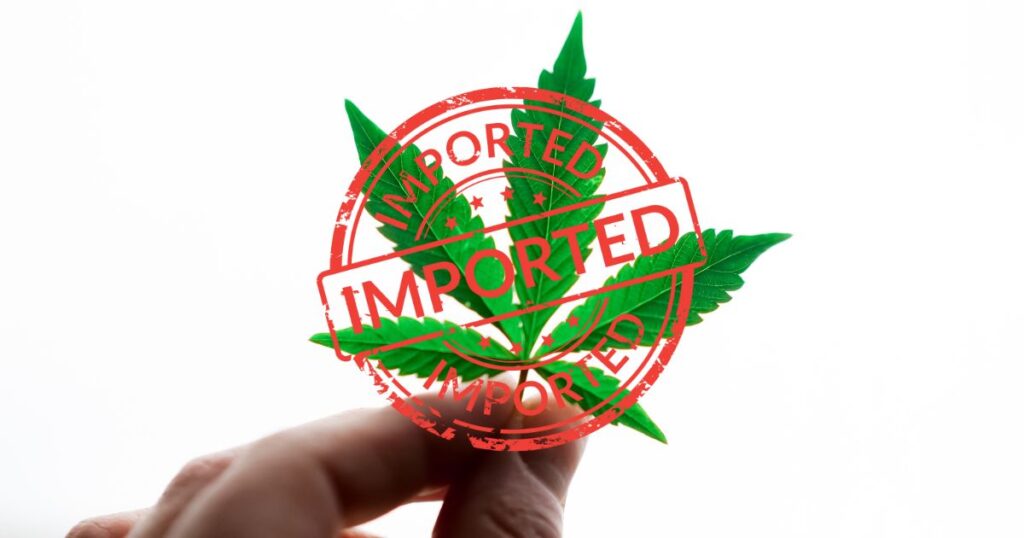The Department of Veterans Affairs (VA) has applied to import cannabis extracts from overseas for veteran PTSD and chronic pain research, exposing a glaring contradiction in federal cannabis policy. While the DEA systematically blocks American companies from producing research-grade cannabis, it now appears ready to approve foreign imports for the same purpose.
This regulatory paradox highlights the dysfunction within America’s cannabis research framework and raises serious questions about why domestic expertise is being ignored in favor of international suppliers.
The VA’s Import Application
According to a Federal Register notice published September 8, 2025, the VA Cooperative Studies Program has applied for DEA approval to import marijuana extract and tetrahydrocannabinols for research and clinical trials. The application specifically targets studies on PTSD and chronic pain in veterans—conditions that have shown promising responses to cannabis-based treatments in preliminary research.
The DEA has opened a 30-day comment period for the application, suggesting the agency may fast-track approval for the VA’s request. This stands in stark contrast to the years-long delays faced by domestic cannabis research companies seeking similar permissions.
American Companies Left Behind
While the VA looks overseas for cannabis research materials, qualified American companies remain trapped in regulatory limbo. Cases like MMJ BioPharma’s represent the most glaring example of this dysfunction.
According to a recent press release about the situation, the company has spent over seven years and millions of dollars pursuing DEA approval to cultivate pharmaceutical-grade cannabis for FDA-approved clinical trials targeting Huntington’s disease and Multiple Sclerosis.
Despite holding FDA Orphan Drug Designations and passing required inspections, MMJ BioPharma continues to face bureaucratic roadblocks. The company’s applications have been delayed for over 2,400 days, with DEA Administrative Law Judge John Mulrooney II recently dismissing their case without allowing evidence to be presented or testimony to be heard.
The contrast is clear. American companies with proven expertise, existing infrastructure, and years of regulatory compliance work sit idle while the federal government prepares to import the same materials from abroad.
Why This Matters for America
The United States pioneered modern cannabis research and maintains some of the world’s most advanced cultivation and extraction technologies. American companies have developed sophisticated quality control systems, security protocols, and manufacturing standards that exceed those found in many international markets.
By blocking domestic production while approving foreign imports, the DEA creates several problems. First, it weakens America’s position as a leader in cannabis research and development.
Second, it introduces unnecessary supply chain risks by relying on international suppliers for critical research materials.
Third, it wastes the substantial investments already made by American companies in developing compliant cannabis production capabilities.
The policy also sends a troubling message about regulatory consistency. If cannabis is safe enough to import for research purposes, why isn’t it safe enough to produce domestically under the same strict oversight?
The Cannabis Research Crisis
This situation extends beyond individual companies to affect the entire landscape of cannabis research. Universities, medical centers, and pharmaceutical companies have struggled for years to access research-grade cannabis materials due to DEA restrictions. Many have abandoned promising research projects or moved operations to countries with more supportive regulatory frameworks.
The Medical Marijuana and Cannabidiol Research Expansion Act, passed by Congress in 2022, was specifically designed to address these barriers by requiring the DEA to expedite research applications.
And now, the agency’s continued obstruction of domestic producers while considering foreign imports suggests a fundamental misunderstanding of congressional intent.
Veterans Deserve Better
Veterans suffering from PTSD and chronic pain need access to effective treatments as quickly as possible. The VA’s research initiative represents an important step toward understanding how cannabis-based therapies might help address these conditions.
However, the research would be more effective, secure, and sustainable if it relied on domestic production capabilities rather than international imports.
American companies have already invested heavily in developing the expertise and infrastructure needed to support this research. Their continued exclusion from the process not only wastes these investments but also delays the development of treatments that could benefit veterans and other patients.
Time for Regulatory Reform
The contradiction between blocking domestic cannabis production while approving foreign imports exposes fundamental flaws in how the DEA approaches cannabis regulation. The agency appears to operate under the assumption that American-produced cannabis is inherently more dangerous than identical materials produced overseas—a position that lacks scientific foundation.
Congress intended the 2022 Research Expansion Act to remove these barriers and accelerate cannabis research. The DEA’s continued obstruction of domestic producers while fast-tracking foreign imports suggests the agency either misunderstands its mandate or chooses to ignore it.
The solution is obvious. The DEA should immediately approve qualified domestic cannabis producers to supply research materials for both VA studies and other FDA-approved clinical trials. This would provide better security, quality control, and supply chain reliability while supporting American innovation and economic development.
Veterans, patients with neurological conditions, and the scientific community would all benefit from a regulatory framework that prioritizes domestic production capabilities over foreign imports. The expertise and infrastructure already exist—they just need regulatory approval to operate.
The VA’s import application inadvertently highlights everything wrong with current cannabis policy. America leads the world in medical research and pharmaceutical development, yet our own government must look overseas for basic research materials that American companies are ready to provide. This isn’t just inefficient policy—it’s a betrayal of American innovation and the patients who depend on it.
The time has come for the DEA to stop being an obstacle to American cannabis research and start being part of the solution. Veterans and patients deserve nothing less.















